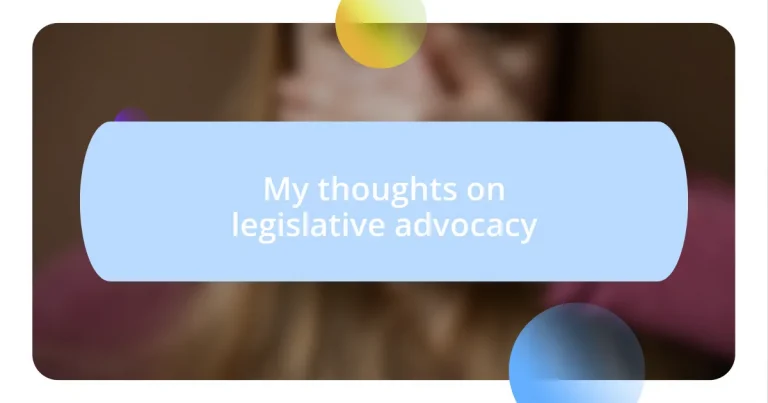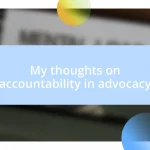Key takeaways:
- Legislative advocacy empowers communities by giving them a voice and enabling them to engage effectively in the democratic process.
- Building coalitions enhances advocacy efforts by combining resources, expertise, and narratives to tackle complex issues collectively.
- Effective engagement with policymakers requires understanding their priorities, being persistent yet respectful, and utilizing personal stories to foster connections.
- Measuring advocacy success includes tracking tangible outcomes, evaluating relationships built, and amplifying community voices as indicators of impact.
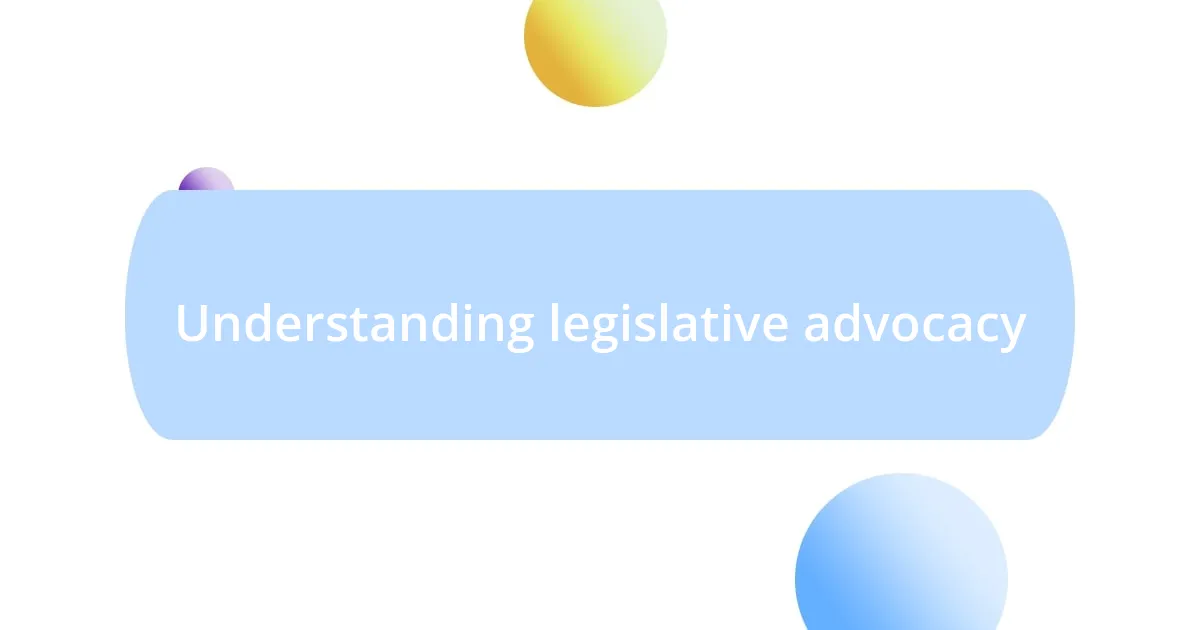
Understanding legislative advocacy
Legislative advocacy is fundamentally about influencing policy to reflect our shared values and needs. I remember attending a town hall meeting where a community member passionately spoke about the need for mental health resources. It struck me how individual stories can translate into powerful advocacy, driving home the importance of each voice in shaping legislation.
When I think about legislative advocacy, I often wonder: how can one person’s experience spark change? For me, it’s about connection. I’ve seen firsthand how grassroots movements connect people—sharing experiences can mobilize communities and highlight issues that legislators might overlook. Each narrative weaves together to create a tapestry of collective concern that lawmakers can’t ignore.
Engaging in this process requires understanding the legislative system and knowing how to navigate it. My experience with drafting letters to representatives made me appreciate the intricacies involved in advocacy. It’s not just about what you say; it’s about how you say it. Tailoring your message to resonate with the specific interests of lawmakers can make a significant difference in initiating dialogue and fostering real change.
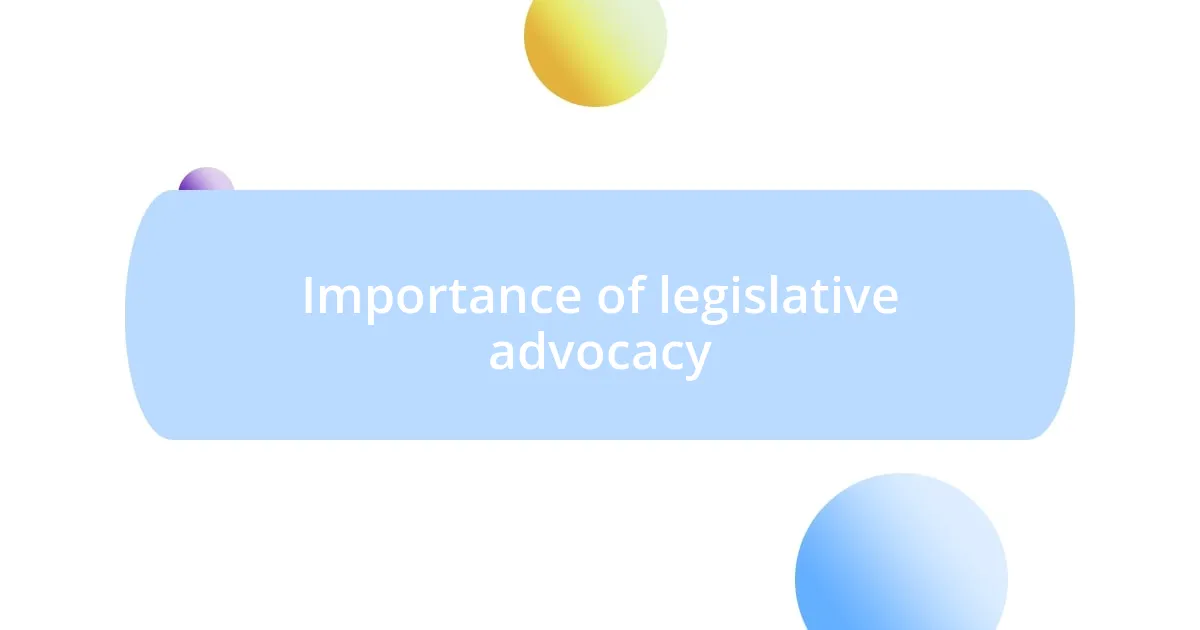
Importance of legislative advocacy
The significance of legislative advocacy can’t be overstated. I’ve often witnessed how legislation directly impacts our daily lives, from healthcare access to education funding. One particular instance that stands in my memory was when a group of local advocates managed to secure funding for a new community health center. Their tireless efforts not only changed the landscape of healthcare access in our area but also inspired those around them to get involved, underscoring the ripple effect advocacy can have.
Here are a few reasons why legislative advocacy is vital:
- Empowers Communities: It gives people a voice, encouraging participation in the democratic process.
- Direct Impact on Policy: Advocates can influence lawmakers to address specific local needs, ensuring that policies align with community priorities.
- Promotes Awareness: Advocacy educates both legislators and the public about pressing issues, contributing to informed decision-making.
- Fosters Collaboration: It brings different stakeholders together, creating coalitions that amplify collective efforts for change.
- Encourages Accountability: Advocates hold lawmakers responsible for their commitments and actions, which is crucial for a functioning democracy.
I’ve seen the passion in people’s eyes when they realize their efforts can lead to tangible change. It’s a powerful reminder that each call to action may be the one that finally resonates.
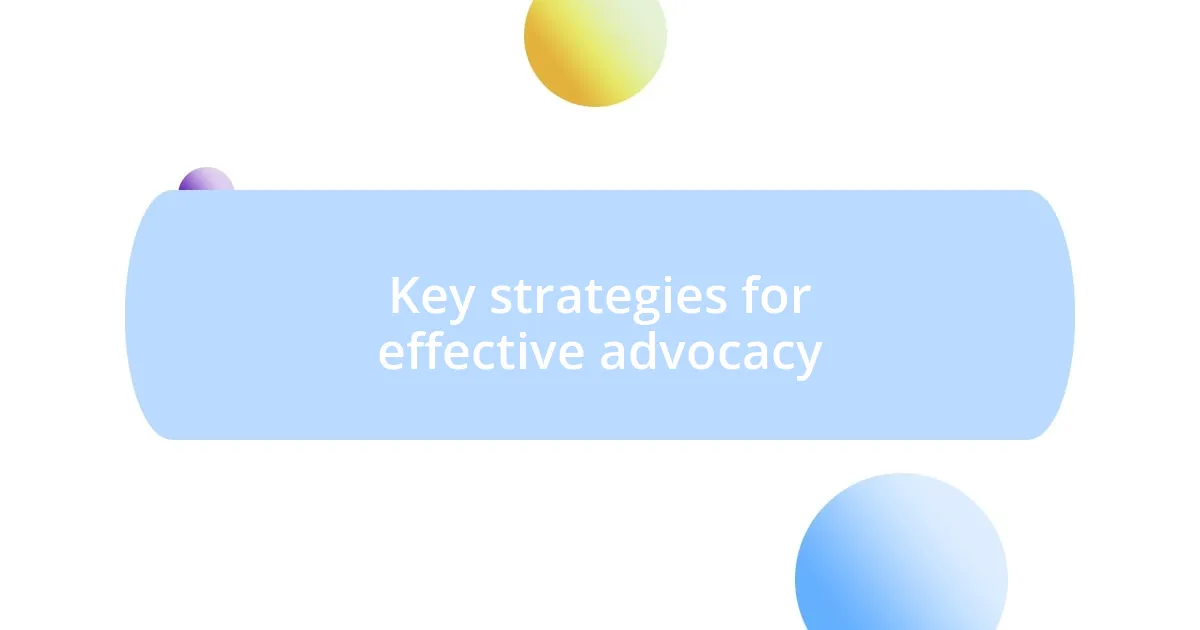
Key strategies for effective advocacy
The effectiveness of legislative advocacy lies in certain key strategies that can turn passionate pleas into impactful actions. One powerful strategy is building relationships with elected officials. I recall a time when I reached out to my local representative after learning about an important policy proposal. Establishing that personal connection not only made me feel heard but opened doors for ongoing dialogue about issues I cared deeply about.
Another significant approach is mobilizing community support. There’s nothing quite like seeing a crowd gather for a cause. I remember organizing a small rally, and the energy in the air was palpable. It’s amazing how collective voices amplify individual stories, demonstrating to lawmakers that their constituents are united and dedicated to certain issues. This grassroots support can be a game changer when advocating for new policies.
Finally, clear and consistent messaging is crucial. Crafting a concise message that outlines the problem, the proposed solution, and why it matters can easily resonate with both lawmakers and the public. In my experience, I’ve seen how a well-articulated message can grab attention and foster support. It’s about being clear and direct—after all, if we don’t communicate effectively, those in power may miss the point entirely.
| Strategy | Description |
|---|---|
| Building Relationships | Fostering personal connections with lawmakers for better communication. |
| Mobilizing Community Support | Uniting individuals under a common cause to show collective strength. |
| Clear Messaging | Creating concise, impactful messages that resonate with various audiences. |
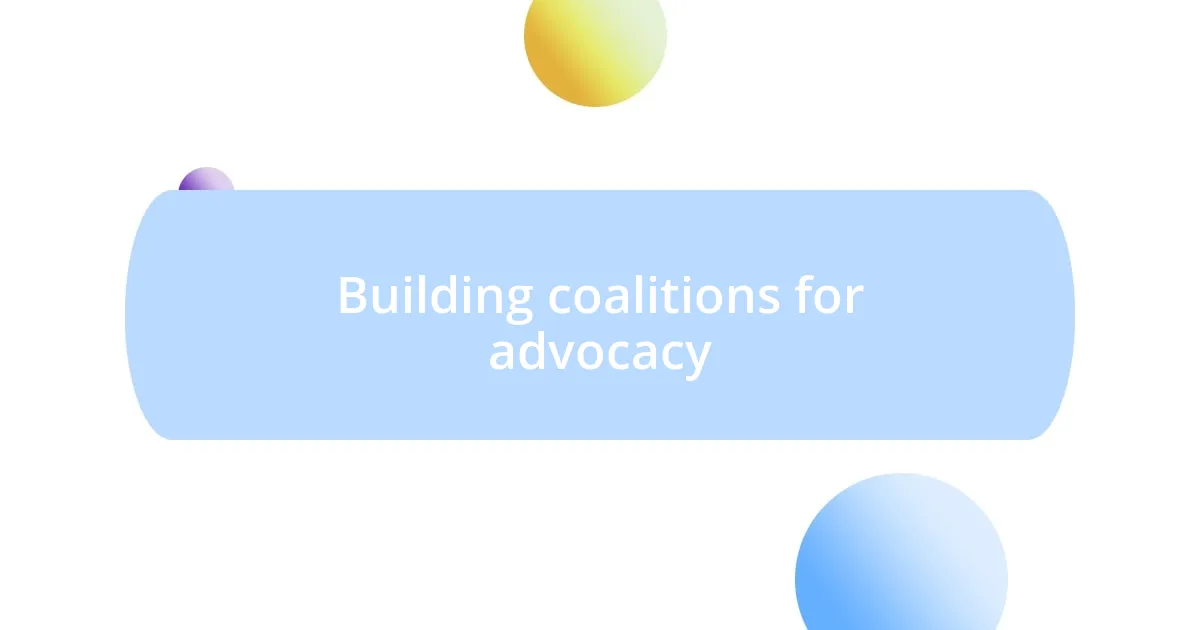
Building coalitions for advocacy
Building coalitions for advocacy is one of the most dynamic aspects of the advocacy process. I recall a memorable experience when I joined forces with several local organizations to address a critical environmental issue. It was amazing to see how pooling resources and expertise made us far more impactful than if we had acted alone. Just think about it—when diverse groups come together, they can tackle complex issues from multiple angles, which not only strengthens our message but also broadens our reach.
Creating these coalitions requires intentional effort and genuine relationships. I’ve learned that trust is built through consistent communication and shared goals. In one coalition I was part of, we held weekly meetings to ensure everyone was on the same page, and we celebrated small victories together. That sense of camaraderie was palpable, reinforcing the idea that we were not just advocating for change but doing it as a united front. Have you ever fallen in sync with a group of people, where every individual’s passion feeds into a larger goal? It’s electrifying.
Moreover, the real power of coalitions lies in their ability to combine voices and narratives. Reflecting on times when I’ve presented before lawmakers alongside representatives from various backgrounds, I noticed that our shared stories made complex issues relatable. This storytelling aspect heightened empathy and urgency, qualities that can sometimes get lost in the political arena. The dynamics of collaboration not only transform the advocacy landscape but also remind us that we’re stronger together. After all, when we amplify each other’s voices, we create a chorus that’s hard to ignore!
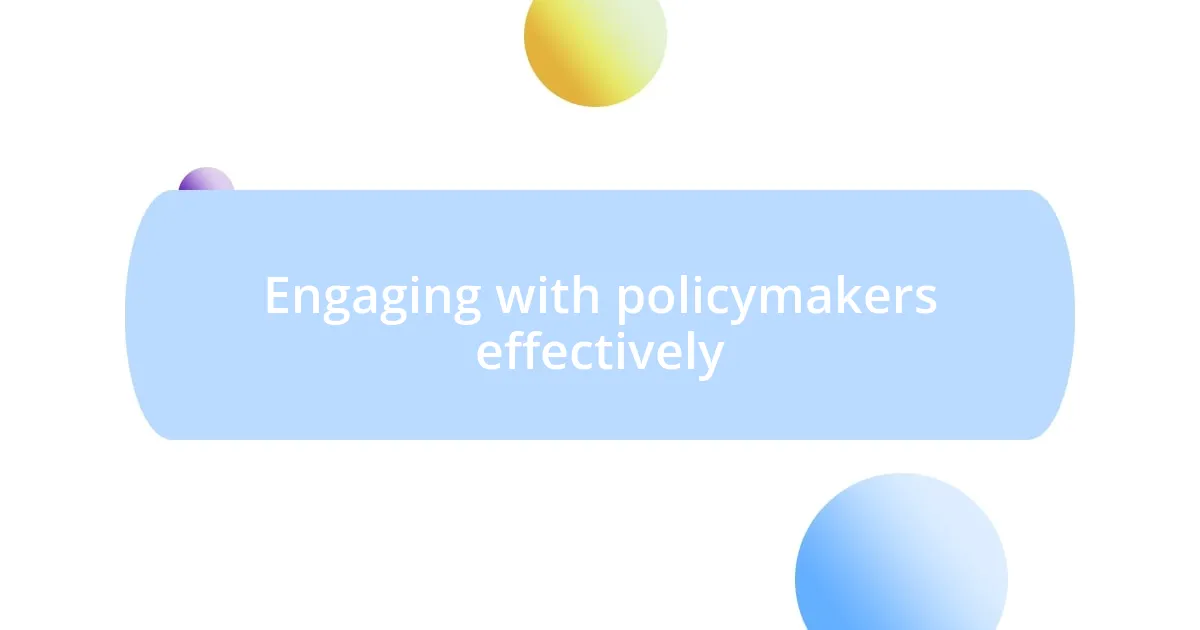
Engaging with policymakers effectively
Engaging with policymakers effectively starts with understanding their priorities and pressures. I vividly remember a meeting where I researched my representative’s recent initiatives before discussing our cause. This preparation not only helped me present our issues more convincingly but also made the representative feel like I respected their time and objectives. Have you ever been in a conversation where the other person genuinely understood your context? It creates a strong bond.
Another key element is being persistent yet respectful. I once sent follow-up emails to a policymaker after our initial meeting, sharing insights and updates relevant to our cause. This gentle reminder kept our discussions alive and demonstrated my commitment. It’s fascinating how regularly checking in can nudge decisions and keep your advocacy front of mind. How often do we assume a silence means disinterest? Sometimes, it simply means your voice needs another nudge.
Moreover, utilizing personal stories can strike a powerful chord. I remember sharing a heartfelt anecdote about a family impacted by a specific policy during a public hearing. The palpable shift in the room’s energy was remarkable; suddenly, it wasn’t just data on a page but a relatable narrative. People often connect with stories over statistics, don’t you think? Personal accounts can bridge the gap between policymakers and the communities they serve, igniting empathy and inspiring actionable change.
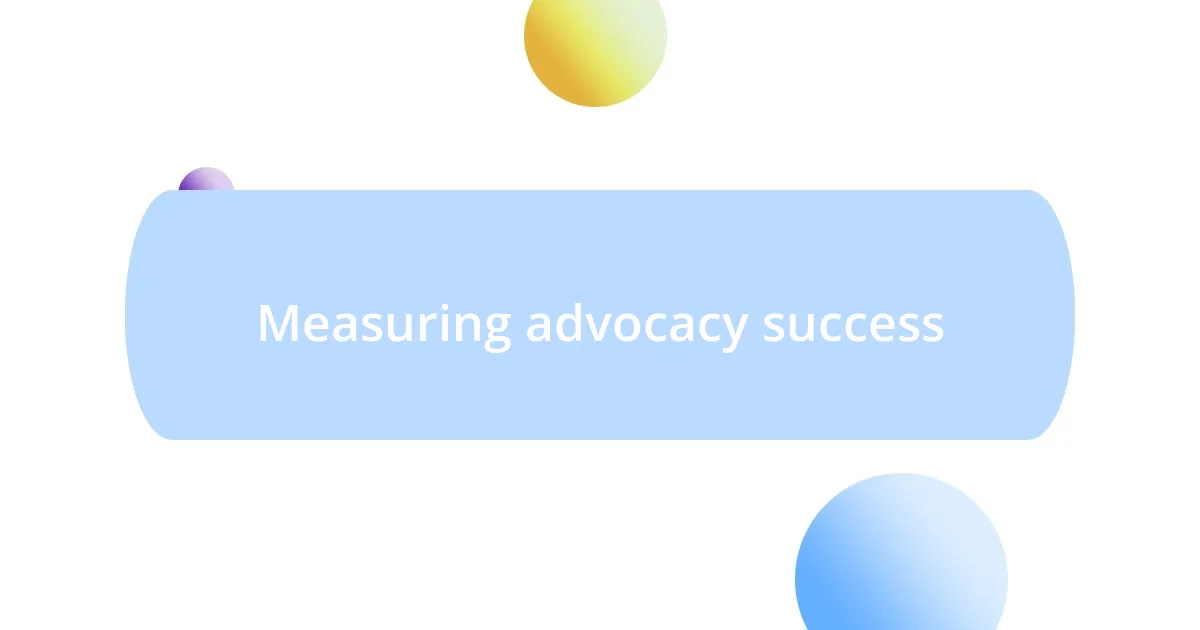
Measuring advocacy success
Measuring advocacy success can sometimes feel like a daunting task, but I’ve learned that it doesn’t have to be. One effective way I’ve gauged our impact is by tracking the tangible changes we see after our campaigns. For instance, there was a time when we organized a community forum focused on highlighting local health disparities. In the months following, we noticed increased funding allocated to those very issues. Isn’t it rewarding when your efforts yield visible results like that?
Another approach to measure success involves looking at the relationships you’ve built along the way. I remember feeling overwhelmed before a pivotal conference, but thanks to the connections I had fostered, I found support and collaboration with others in the room. Reflecting on those alliances, I realized that advocacy isn’t just about the end goals; it’s also about the collaborative spirit we cultivate. How often do we underestimate the value of these networks and the positive changes they can bring?
Lastly, amplifying community voices is a critical metric of success. I once participated in a grassroots campaign where we trained community members to share their experiences in front of stakeholders. The sheer number of people who stepped up to speak was electrifying. It reinforced my belief that advocacy’s most profound measure isn’t just legislative wins but the empowerment of individuals to stand up for themselves. Have you thought about how empowering others creates a ripple effect that can change entire communities? It’s these moments of growth that remind me why we advocate in the first place.
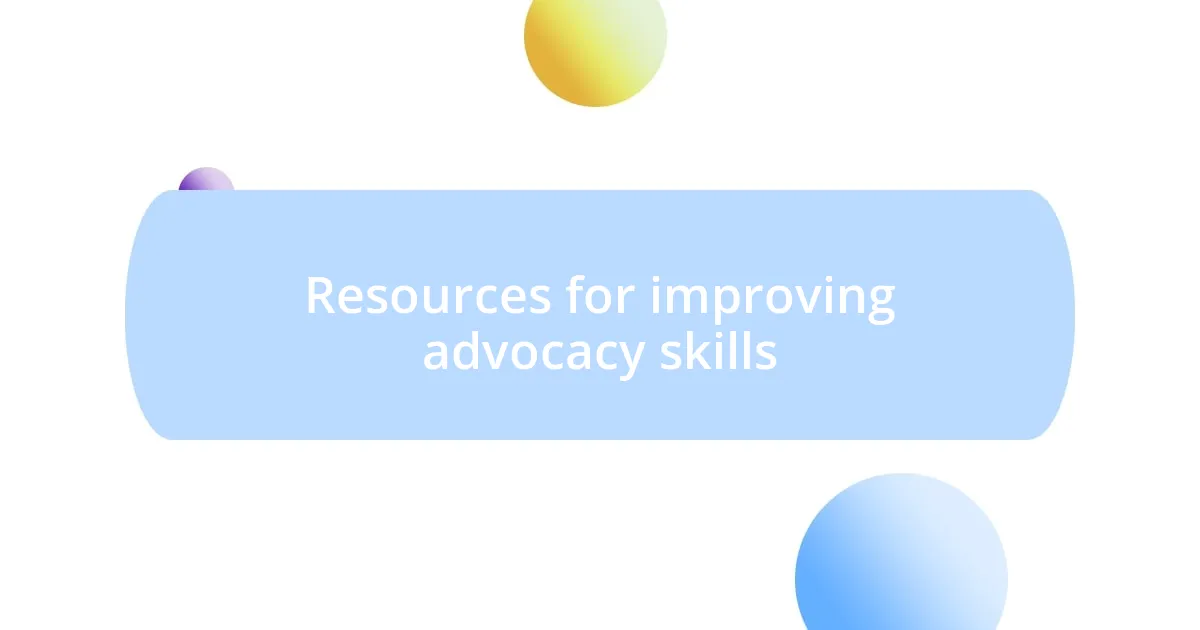
Resources for improving advocacy skills
To enhance your advocacy skills, I’ve found that tapping into online courses can be incredibly beneficial. Platforms like Coursera and edX offer courses specifically focused on advocacy and public policy. I remember completing a course on policy analysis that transformed the way I approached discussions with lawmakers. The practical frameworks I learned helped me dissect complex policies into digestible elements, making my arguments more compelling. What resources have you utilized to gain a deeper understanding of this process?
Books can also be powerful allies in refining your advocacy skills. One of my favorites is “The Art of Advocacy” by Charlie E. Smith. The insights I gained from its case studies profoundly influenced my strategy. Each chapter reminded me that understanding the emotional landscape of those we advocate for can truly drive change. Have you ever found a text that reshaped your perspective? It’s these little revelations that can really motivate you to push boundaries.
Additionally, networking with experienced advocates through seminars and workshops is invaluable. I recall attending a regional summit where seasoned advocates shared their journeys and challenges. Their candidness inspired me to embrace my own setbacks as learning opportunities. Engaging in dialogue with these professionals not only expanded my knowledge but also instilled a sense of community that fuels my passion for advocacy. Have you considered how sharing experiences can empower all of us to become better advocates?












